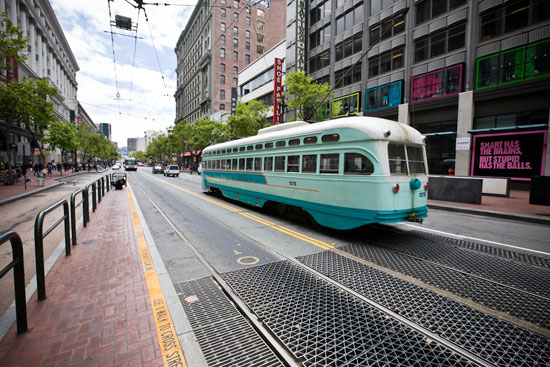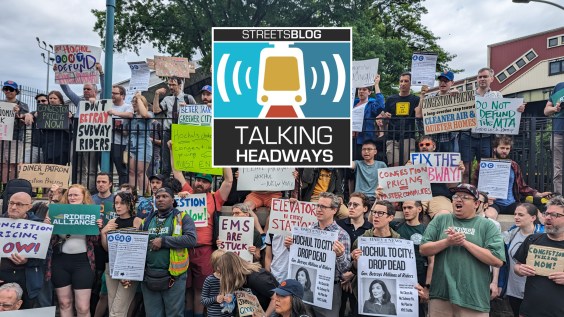
As the November election draws near and the bunkers are dug on either side of San Francisco's Proposition G, the Fix Muni Now ballot measure spearheaded by Supervisor Sean Elsbernd, the rhetoric is escalating, with Mayor Gavin Newsom, the San Francisco Chronicle's Editorial Board and Elsbernd on one side decrying Muni operators for taking raises during a recession, while the San Francisco Bay Guardian and the Muni operators union have focused on Elsbernd, implying he's a racist pawn of downtown business interests on a mission to erode the power of unions.
While the acrimony is likely to increase, it is unclear just how far Proposition G will go toward "fixing" Muni. If the measure passes, it will eliminate the City Charter provision guaranteeing Muni operators' salary and benefits are pegged at the average of the top two transit agencies in the country. It would also compel Transit Workers Union (TWU) Local 250-A, which represents Muni operators, to re-write its memorandum of understanding (MOU) with the agency, likely removing a number of work rules and side letters, or components of a contract agreed to by both sides that make stipulations for parking perks, absenteeism and sick-day policies, among others.
"I think that it's plain good governance to not have a minimum salary set in a charter," said Dave Snyder, organizer for the Muni Transit Riders' Union, which has not taken a position on the measure. Snyder noted that even a competing Muni ballot measure proposed by some on the Board of Supervisors and supported by the TWU eliminated the charter provision. That measure never made the ballot, though, as Board President David Chiu voted against it in a compromise with Mayor Gavin Newsom on the city's budget.
Snyder cautioned against believing that the ballot measure would transform Muni overnight. "Taking the salary calculation out of the charter is not going to make sure all the buses leave the yard on time, all the time," he said. Though he stopped short of saying the phrase "Fix Muni Now" was misleading, he said the public shouldn't be confused about the limitations of the measure.
Even one of Proposition G's co-sponsors acknowledged the measure wouldn't fix Muni. "It's important not to oversell Prop G. Yes, it's absolutely necessary, but it won't fix Muni," said Gabriel Metcalf, executive director of the San Francisco Planning and Urban Research Association (SPUR), which also helped pass Propositions E and A to merge Muni with the Department of Parking and Traffic to create the San Francisco Municipal Transportation Agency (SFMTA) and then to increase its autonomy from the Board of Supervisors.
Metcalf said Proposition G was merely one part of SPUR's larger SFMTA reform agenda, but a necessary step toward delivering better transit service. "Prop G is not the first step in improving Muni and it's not the last step either," he said. "We have in the last 10 years done a long list of things to try to get San Francisco the kind of transit system it deserves."
Supervisor Elsbernd disagreed, saying the measure would fix Muni and arguing management at the SFMTA has its hands tied because of the charter guarantees. "I think that [Proposition G] will absolutely improve Muni and free up dollars that are currently not going to service," he said. Elsbernd noted If the measure passes, negotiators with the SFMTA would likely start preparing for collective bargaining for a new contract with the TWU, given that the current contract expires at the end of June, 2011.
Without the charter rules, said Elsbernd, the SFMTA would immediately save $16 million if it eliminates the trust fund it has set up to pay drivers when their benefits don't meet the second highest national benefits package and it doesn't have to give the operators the scheduled raise next year. He also estimated eliminating a number of work rules would save the agency at least $10 million more annually.
Elsbernd highlighted language in Proposition G that he said "was one of the best parts of the measure," where in the case of arbitration over contract impasse, the arbitrator would be required to consider how the contract would impact Muni service. If the SFMTA felt the arbitrator had not sufficiently addressed the impact of a work rule or salary provision on Muni's service, the SFMTA could take the issue to court, where a judge would preside over the dispute.
"This should be about making service better, not about making a union happy," said Elsbernd. "Why in the world should we provide transit service where service is not the most important priority? [Proposition G] gives the riders a seat at the table and the city is there to defend them."
While TWU President Irwin Lum said the charter provision for their salary had been "working well since 1968," he said the union supported removing it and bargaining collectively. He bristled, however, at the arbitration language and said it handicapped the union from the start in any negotiation, tipping the balance to management before they'd even sat down at the table. "No other city employee union has it where it tells the negotiator or arbitrator" to account for how the contract would affect the service the membership provides, such as police officer pay tied to crime reductions.
Lum said the ballot measure was little more than "a blame game," that it deflects attention away from failures at the management level. He also said it wouldn't compensate for the lack of political will from the SFMTA Board and the Mayor's Office to come up with a dedicated funding stream for Muni, such as transit tax assessment district. "All it will do is make drivers seem like the only reason why Muni doesn't perform better."
He said the SFMTA could stop paying work orders to other agencies, which have increased significantly since the passage of Proposition A in 2007, and the agency would save over $60 million a year, far more than would be saved if Proposition G passes.
Lum also criticized SFMTA CEO Nat Ford's salary, which, at more than $300,000 base, is the highest of any city official, and compared it to the salaries the operators receive. "At $27.91 an hour, that wage is not over and above Bay Area transit wages," said Lum "We're not overpaid and we're not underpaid. It's a living wage." He lamented that voters didn't have the same opportunity in the measure to vote on Ford's salary or other members of his executive staff and assumed the public would not pay them as much if they had the option.
According to SFMTA figures, Muni's 2,000 operators make a combined $200 million in salaries and benefits, while the 100 managers that make up the Municipal Executive Association make $20 million in salaries and benefits. The agency's annual operating budget this fiscal year is approximately $750 million.
Metcalf declined to say what he thought the senior executives should make, but he noted current salaries are comparable to the industry standard. Dorothy Dugger, BART's General Manager, made nearly $350,000 in 2009, while John Inglish, head of the Utah Transit Administration, which is much smaller than the SFMTA or BART, made the same last year. Metcalf also said he didn't think the operators' salaries would plummet if Proposition G passed.
Metcalf and Snyder argued once the contract was negotiated, the real work would begin, both to improve cooperation between management and the operators' union, and to identify a steady source of funding for Muni over the long run. There are numerous revenue generating actions the SFMTA board of directors could take to bring in more money, but the body has so far not pursued them. Extending parking meter hours on evenings and Sundays, for instance, was projected to generate $10 million annually, but the board has dropped the idea.
While Sacramento appears willing to leave the state diesel tax alone this year [pdf], sending hundreds of millions in money to transit agencies across the state instead of using the money to backstop the general fund, there is no guarantee the raids won't resume under a new governor (unless state Proposition 22 passes). The SFMTA had been deprived of nearly $180 million in state money over the past three fiscal years.
"[Proposition G] is necessary, but a lot more is going to have happen. Management and workers are going to need to work together to create a culture where everyone is working toward the same goals of providing great transit service," said Metcalf. "We're going to have to do a lot of hard stuff after this, too."





